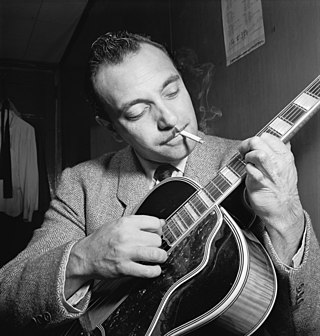
Jean Reinhardt, known by his Romani nickname Django, was a Romani-Belgian jazz guitarist and composer. He was one of the first major jazz talents to emerge in Europe and has been hailed as one of its most significant exponents.

Stéphane Grappelli was a French jazz violinist. He is best known as a founder of the Quintette du Hot Club de France with guitarist Django Reinhardt in 1934. It was one of the first all-string jazz bands. He has been called "the grandfather of jazz violinists" and continued playing concerts around the world well into his eighties.

David Jay Grisman is an American mandolinist. His music combines bluegrass, folk, and jazz in a genre he calls "Dawg music". He founded the record label Acoustic Disc, which issues his recordings and those of other acoustic musicians. He was inducted into the International Bluegrass Music Hall of Fame in 2023.

The Rosenberg Trio is a Dutch jazz band consisting of lead guitarist Stochelo Rosenberg, rhythm guitarist Nous'che Rosenberg and bassist Nonnie Rosenberg. The band is influenced by Django Reinhardt, the gypsy jazz guitarist of the 1930s.
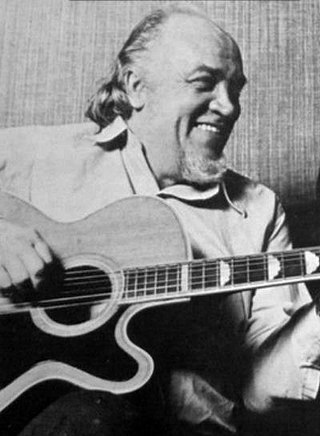
Denys Justin Wright, known professionally as Denny Wright, was a British jazz guitarist.

Biréli Lagrène is a French jazz guitarist who came to prominence in the 1980s for his Django Reinhardt–influenced style. He often performs in swing, jazz fusion, and post-bop styles.
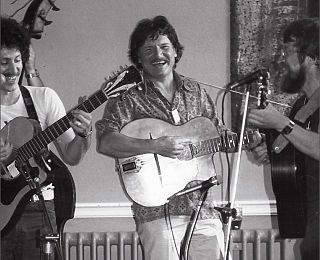
William Charles "Diz" Disley was an Anglo-Canadian jazz guitarist and banjoist. He is best known for his acoustic jazz guitar playing, strongly influenced by Django Reinhardt, for his contributions to the UK trad jazz, skiffle and folk scenes as a performer and humorist, and for his collaborations with the violinist Stéphane Grappelli.

Gypsy jazz is a musical idiom inspired by the Romani jazz guitarist Jean "Django" Reinhardt (1910–1953), in conjunction with the French jazz violinist Stéphane Grappelli (1908–1997), as expressed in their group the Quintette du Hot Club de France. Because its origins are in France, Reinhardt was from the Manouche clan, and the style has remained popular amongst this clan. Gypsy jazz is often called by the French name "jazz manouche", or alternatively, "manouche jazz" in English language sources.
The Quintette du Hot Club de France, often abbreviated "QdHCdF" or "QHCF", was a jazz group founded in France in 1934 by guitarist Django Reinhardt and violinist Stéphane Grappelli and active in one form or another until 1948.

Tim Kliphuis is a Dutch violinist renowned for mixing gypsy jazz with classical and folk music, whose recent works have been dedicated to raising awareness about climate change.
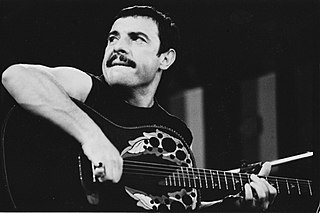
Christian Escoudé is a French Gypsy jazz guitarist.
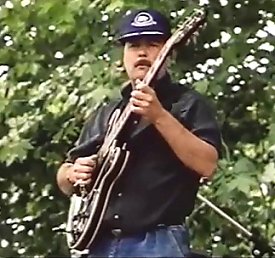
Jean-Jacques "Babik" Reinhardt was a French guitarist and the younger son of gypsy jazz guitarist Django Reinhardt by Django's second wife, Naguine. His elder half-brother Lousson, who was Django's son by his first wife, Bella, was also a guitarist, but the two grew up in different families and rarely met. He was christened Jean-Jacques but generally known by his family nickname, Babik.

Joseph "Jimmy" Rosenberg is a Dutch Sinto-Romani guitarist known for his virtuoso playing of gypsy jazz.
Ike Isaacs was a Burmese-English jazz guitarist, best known for his work with violinist Stéphane Grappelli.
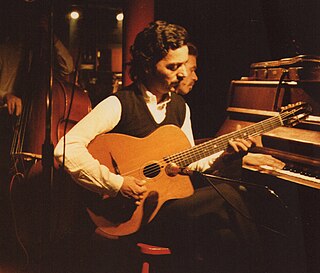
Fapy Lafertin is a Belgian guitarist in the Belgian-Dutch gypsy jazz style.

Dawgwood is a 1993 all-instrumental album by American musician David Grisman, recorded with his group David Grisman Quintet. It is the second album recorded under Grisman's own label, Acoustic Disc. Grisman's self-named "Dawg" music was well established when this album was recorded — it is influenced by traditional bluegrass, jazz, gypsy music, Latin and more. Most of the songs are composed by Grisman, the two covers being Django Reinhardt's "Bolero de Django" — a gypsy song which Matt Eakle's flute gives a more modern flavour and "Asanhado" by Jacob do Bandolim. The last piece on the album, "New Dawg´s Rag" is a song previously released on album The David Grisman Quintet, but with "updated" arrangement.
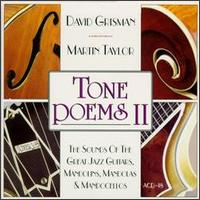
Tone Poems 2 is an album by American mandolinist David Grisman and British guitarist Martin Taylor that was released in 1995 by Grisman's label, Acoustic Music. It is a sequel to Tone Poems, his collaboration with bluegrass guitarist Tony Rice. This is a jazz-oriented recording on which Grisman and Taylor play a variety of vintage, fretted, acoustic instruments. They use 41 guitars, mandolins, mandolas, mandocellos, and tenor guitars.

Pearl Django is a jazz group established in 1994 in Tacoma, Washington by guitarists Neil Andersson and Dudley Hill and bassist David "Pope" Firman. The group melds the music of Django Reinhardt and Stephane Grappelli with American Swing. Initially a trio, they have changed and added members over the years and are now a quintet. Based in Seattle, they have played around the United States, as well as in France and Iceland.

Joseph "Nin-Nin" Reinhardt (1912–1982) was the younger brother of guitarist Django Reinhardt and played rhythm guitar on most of Django's pre-war recordings, especially those with the Quintette du Hot Club de France between 1934 and 1939. He was a pioneer of the amplified jazz guitar in France and performed for years on a home-made instrument of his own design.

The Hot Club of San Francisco is an American gypsy jazz band. Led by guitarist, songwriter, and arranger Paul 'Pazzo' Mehling, the group uses the instrumentation of violin, bass, and guitars from Django Reinhardt and Stephane Grappelli’s Quintette du Hot Club de France and performs arrangements of gypsy jazz standards, pop songs, and original compositions by Mehling. The Hot Club of San Francisco includes violinist Evan Price, the vocals of various members, and a swing rhythm section. In the book, Django Reinhardt and the Illustrated History of Gypsy Jazz, Michael Dregni refers to the Hot Club of San Francisco as "one of the first American gypsy jazz bands."




















